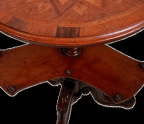Dante’s blessed damozels

D ANTE GABRIEL ROSSETTI changed British art at the age of 20 and, having done so, never really outgrew the obsessions of his youth. Rossetti was one of the seven founder members of the pre-Raphaelite Brotherhood, a group of painters, sculptors and critics determined to reform art and clear it of old, staid conventions. Wanting to change the world—and believing it can be done —is a young man’s trait and the original members had barely hit adulthood; indeed, one of them, John Everett Millais, was still a teenager when they embarked on their crusade.
‘Rossetti was wrapped in Dante, Christianity and the heady Victorian genre known as “dreams of fair women”’
They signed their works with ‘PRB’ in lieu of their individual names and came up with a credo that was earnest bordering on pompous: they committed to having ‘genuine ideas to express’; to studying Nature ‘attentively’; to sympathising with what was ‘direct and serious and in which he lambasted the figure of Mary as ‘so hideous in her ugliness that… she would stand out from the rest of the company as a Monster, in the vilest cabaret in France, or the lowest gin-shop in England’. Needless to say, the PRB became instantly famous.
You’re reading a preview, subscribe to read more.
Start your free 30 days





